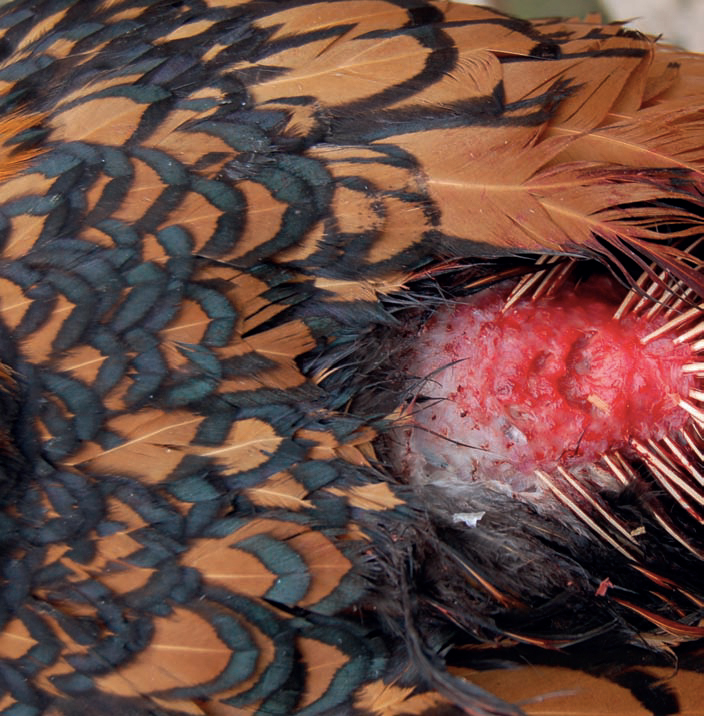Chickens are not always kind to each other. Learn how to keep your hens safe and solve some flock problems with this excerpt from The Chicken Keeper’s Problem Solver.

Keep a wary eye on the condition of birds with missing feathers; these individuals should be isolated at the first sign of blood, for their own safety. Photo by Chris Graham.
PRIMITIVE BEHAVIOR
Newcomers to the chicken-keeping hobby are frequently surprised—and often shocked—to discover just how vicious their feathery friends can be. Anything smaller than they are is regarded as a potential target for snacking on, and they won’t hesitate to turn viciously on an injured flockmate, given the opportunity.
PROBLEM
One of my hens has been attacked by the others.
CAUSE
Chickens are drawn to the sight of blood; even the most mild-mannered hen can become a frenzied attacker under certain circumstances. What is more, attackers will show no mercy.
SOLUTION
An occasional tussle—the sort of thing that happens as birds establish the pecking order within their group—is nothing to worry about; it is a perfectly normal part of day-to-day life in the chicken run. However, things become more serious if there is blood involved. A bird that gets injured badly enough to break the skin is likely to be set upon by the rest of its flockmates once they catch sight of the blood. A kind of bloodlust develops which, if ignored, can quickly escalate. Consequently, it is vital that keepers remain vigilant at all times, inspecting birds on a daily basis to check for signs of injury and/or bleeding.
Any injured birds will need to be removed from the main run and isolated for their own safety. They should be kept apart from the rest until their wounds have been treated and/or healed naturally (depending on their severity). It is also worth noting that bird-to-bird pecking can be prompted by overcrowding, boredom resulting from a poor environment, and inadequate food. A substandard feed ration that is badly formulated or short on protein can prompt the birds to seek sustenance elsewhere, which they may do by pecking at the feathers (which are 80 percent protein), first on the ground, then on flockmates. Always use a reputable brand of chicken feed and, if necessary, add a suitable dietary supplement to the drinking water (your vet or poultry specialist supplier will be able to advise). You can help alleviate boredom by suspending fresh vegetables in the run at head height for the birds, or by giving them pieces of fresh sod from elsewhere in the yard to peck and scratch at.
PROBLEM
My hens keep pecking at each other’s feathers.

Feather pecking can quickly get out of hand if the victim’s skin is broken and blood starts to flow. Keepers need to be vigilant at all times, so that problems can be nipped in the bud before they escalate to this level. Photo by Chris Graham.
CAUSE
Feather pecking can be triggered by environment-based factors, such as a lack of space, a poor environment, enforced confinement, and, most difficult to deal with of all, straightforward bullying.
SOLUTION
To deal effectively with a feather-pecking problem you need to understand the common triggers for it. Overcrowding is one—something that all chicken keepers must avoid. Also, remember that hens need stimulation in their everyday lives. Those kept in cramped conditions or featureless runs will develop problems, both disease- and behavior-related.
Bullying is a problem that can occur at any time, even if you have provided your chickens with the ideal conditions in which to live. Some birds are just more aggressive than others, and will almost inevitably cause problems for those lower down the pecking order. This sort of dominant behavior often manifests itself in pecking attacks to the victim’s head. The aggressor may stop the bird it is targeting from feeding or drinking, or from entering the hen coop to lay or roost. Sometimes these situations resolve themselves as the bullied bird learns to keep out of the way (assuming there is sufficient space for it to do so). In other cases, though, it does not, and the situation simply worsens. When this happens, the only practical option is to remove the aggressor.
Pecking can also become a problem when new birds are introduced to an existing flock, which inevitably upsets the established order of things. Introducing newcomers at night, into the coop when the flock is already roosting and settled, is generally regarded as being the best approach, but smooth relations are never guaranteed. While the birds can be allowed to reestablish the pecking order themselves to a degree, supervision will be required to ensure that the initial tussles do not turn more serious.
These suggestions were excerpted from pgs 200-203 of The Chicken Keeper’s Problem Solver by Chris Graham. Used with permission from Quarry Books.













1 Comment
I have 16 hens, 2 roosters and 4 chicks at the moment and accidents and injuries happen, I would like to think otherwise… but…, anyway if one of my critters get injured there is much cooing and reassuring and calling to me to be nurse / doctor and they never peck or harm the injury. No matter how much blood – I guess I must be lucky.